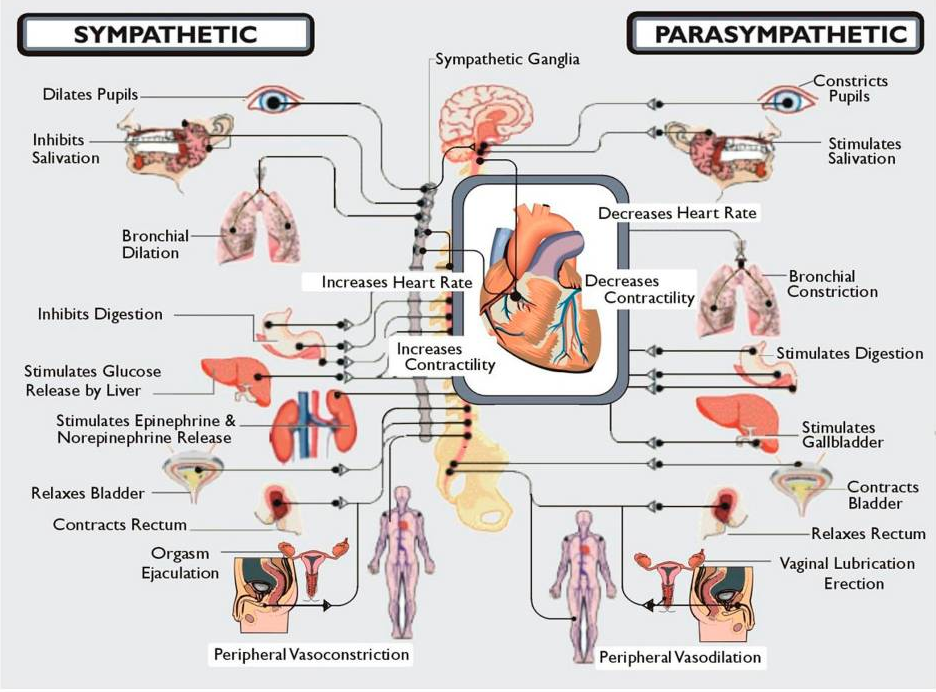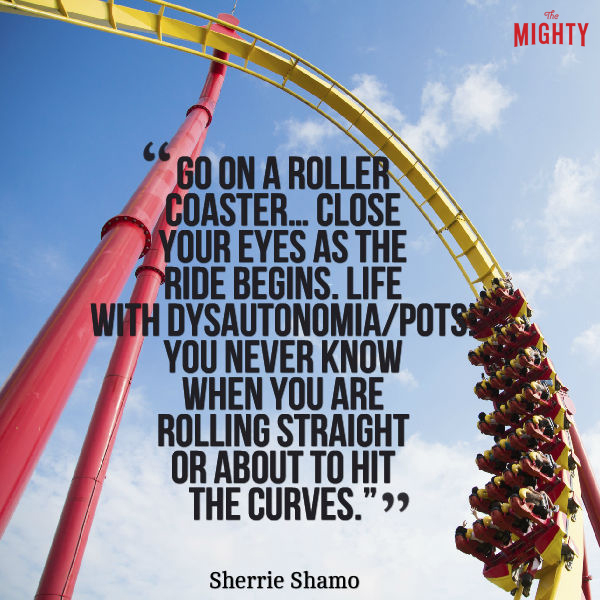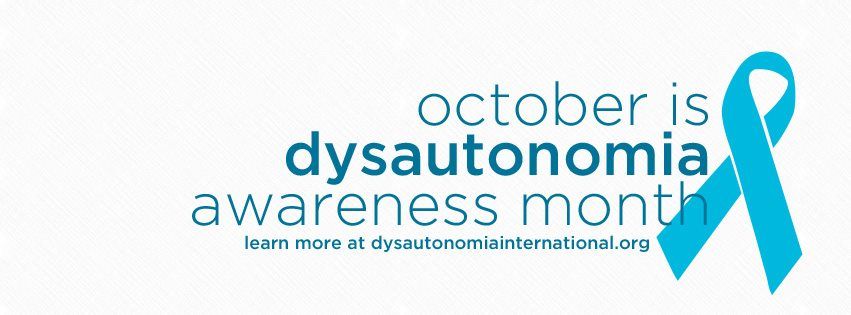I actually debated about talking about this. I actually almost never really talk about this unless I have to talk about it. I have lived with this my whole life and my extended family really has only recently become aware of it (I told you I don't talk about it). It was something that I could easily brush off to being no big deal. It was just something I learned to deal with and really was more of an annoyance rather than something that affected me to the point I had to be hospitalized. Granted it has affected me in a greater way now, but I still feel that I have been very lucky compared to some.
My reason for talking about it now is that I've talked to people who have the same diagnosis and I saw that a few of them have problems that affect them in a great way. Some have been hospitalized or have had to find ways to accommodate their disability. One of the biggest problems are people around them that don't understand or even doctors who are not aware of these problems. Heard of the woman who was shamed for using a handicapped space where someone sent them a note on their car? At least one of those cases was a dysautonomia patient. So, I thought I'd shed some light on it and if you know someone who has a form of this (or yourself) you can find out how to be more educated. I'm just going over the fine points.
What is dysautonomia?
According to Dysautonomia International it is:
This is such a good general video on dysautonomia
Here are some more links to find out more:
Dysautonomia International
Dysautonomia International Facebook Page
10 Facts about POTS
Donate to Dysautonomia International (for education, research, and medical training)
I hope this sheds some light on dysautonomia and POTS in general. I just wanted to introduce this syndrome to those that don't know about it at all and gain more knowledge about this disorder. It is one of those problems that isn't easily seen and has a wide variation of how it affects a person. If you know someone who has it, you suspect it, or if you know a doctor who needs educating, the links above are great resources to find out about the various forms of dysautonomia. Thanks for reading!
 |
| From Dysautonomia International. Click to enlarge. |
Dysautonomia is an umbrella term used to describe several different medical conditions that cause a malfunction of the Autonomic Nervous System. The Autonomic Nervous System controls the "automatic" functions of the body that we do not consciously think about, such as heart rate, blood pressure, digestion, dilation and constriction of the pupils of the eye, kidney function, and temperature control. People living with various forms of dysautonomia have trouble regulating these systems, which can result in lightheadedness, fainting, unstable blood pressure, abnormal heart rates, malnutrition, and in severe cases, death.
Dysautonomia is not rare. Over 70 million people worldwide live with various forms of dysautonomia. People of any age, gender or race can be impacted. There is no cure for any form of dysautonomia at this time, but Dysautonomia International is funding research to develop better treatments, and hopefully someday a cure for each form of dysautonomia. Despite the high prevalence of dysautonomia, most patients take years to get diagnosed due to a lack of awareness amongst the public and within the medical profession.
My form is called POTS (Postural Orthostatic Tachycardia Syndrome). It is (according to Dysautonomia International:
[It is] estimated to impact 1 out of 100 teenagers and, including adult patients, a total of 1,00,000 to 3,000,000 Americans. POTS can cause lightheadness, fainting, tachycardia, chest pains, shortness of breath, GI upset, shaking, exercise intolerance, temperature sensitivity and more. While POTS predominantly impacts young women who look healthy on the outside, researchers compare the disability seen in POTS to the disability seen in conditions like COPD and congestive heart failure.I was diagnosed a million years ago before it was referenced as POTS. In fact POTS has only been recently coined and my pediatrician called it something else which I don't remember (it has recently been reaffirmed as POTS so I know it was the same thing by talking to my docs) but I did know it was a form of dysautonomia. I do remember him saying that as long as I don't faint then don't worry about it. He should have been more specific since I didn't realize at the time that near fainting (near syncope) should have also been seen. *giggle snort* I have had a few of those and know how to avoid fainting so far (I recognize the signs early and haven't had an episode in quite a while). Listing few symptoms I get often have been tachycardia, shortness of breath, dizziness, temperature sensitivity, shaking, sudden weakness, blood pressure anomalies and exercise intolerance and I'm sure a few more I forget to mention.
 |
| From The Mighty: 21 People Describe what POTS Feels Like |
Here are some more links to find out more:
Dysautonomia International
Dysautonomia International Facebook Page
10 Facts about POTS
Donate to Dysautonomia International (for education, research, and medical training)
I hope this sheds some light on dysautonomia and POTS in general. I just wanted to introduce this syndrome to those that don't know about it at all and gain more knowledge about this disorder. It is one of those problems that isn't easily seen and has a wide variation of how it affects a person. If you know someone who has it, you suspect it, or if you know a doctor who needs educating, the links above are great resources to find out about the various forms of dysautonomia. Thanks for reading!


Thanks so much for posting this, it is something I know very little about. So sorry you are living with this but so glad that they are making more people aware about it to help those that do suffer from it.
ReplyDeleteI've always had it so I've not known the difference. :) Thanks for reading about it.
DeleteKnowledge is power! I did know someone years ago who has this. Posts like this help other not feel so alone and educate those who would otherwise be ignorant (like the note leaving idiots)
ReplyDelete<3
Karen @For What It's Worth
LOL! I do hope that more people become educated. Knowledge IS power. :)
DeleteSending hugs, awareness is always a good thing.
ReplyDeleteLainy http://www.alwaysreading.net
Thanks! :)
Deletethank you for sharing Melissa, it takes a lot of courage at times to come forth with something so personal to you. I have to say that before reading your post, I have never heard of this, but you have shed some light by making another person aware.
ReplyDeleteI think a lot of people haven't heard of it even though it isn't considered rare at all.
DeleteI know that any post you start with "I actually debated about talking about this," is one I'm going to want to read. Thank you for sharing. You already have such interesting/important things to say. I had no clue what Dysautonomia is. You rock, my friend!
ReplyDeleteLOL! Thanks. I just don't talk about it, because I just didn't. No real reason. I've been doing it more so I've gotten much better about it.
DeleteAw thanks! I am actually surprised that more docs didn't know about this more.
ReplyDeletethanks for the post. I didn't know really about that so it's interesting.
ReplyDeleteThanks for reading!
DeleteThis is a great post. Thanks so much for sharing. I didn't know about this condition before you mentioned it. There are so many conditions that are out there and so many people know nothing about them. I know how it feels to be one of those people who look healthy and people don't believe there are issues. I have an autoimmune condition. I've had people make comments about "how can you be tired, you don't have kids". I try to educate people that just because you look healthy, doesn't mean you're actually healthy. It is always best to educate people, because most of the time they just don't realize that what they are saying is hurtful. I know it isn't always easy. I can't always do it, but I try, when I'm able and feel up to it. I can understand when it is hard for people too. I'm glad you're sharing. It sounds like your condition is mostly under control at the moment. I hope it stays that way. :-) Have a great week.
ReplyDeleteMelanie @ Hot Listens & Rabid Reads
Well, I cannot say it is mostly under control, but not horrible either. :) I think you'd like the shirt I recently saw: "But you don't look sick. You don't look stupid either. Guess we are even." LOL
DeleteI hope you feel better and stay that way!
I'd never heard of this before! Thanks for sharing such good info!
ReplyDeleteThanks for reading! :)
DeleteWow. Thanks for posting this. I legitimately have never heard of this which is honestly kind of surprising.
ReplyDeleteA lot of docs don't really understand it either. :(
DeleteThanks for sharing and creating awareness. I live with an autoimmune disease and look healthy so people don't understand why I am tired or don't want to come out and play. I knew about this condition but not its name. Thank you for raising awareness.
ReplyDeleteI do hope you feel better and stay that way! I think awareness goes a long way to understanding. I also think you may need the same shirt I recommended to Melanie: "But you don't look sick. You don't look stupid either. Guess we are even." :D
DeleteI'm really glad you shared, Melissa! The more people you educate, the more aware they'll be.
ReplyDeleteI hope so! :)
DeleteWell done you. Important that people are aware of these conditions, that they are educated that no everyone who 'looks healthy' doesn't have health issues. Hopefully others with the condition will read this and realise they are not alone which I think can be a huge obstacle.
ReplyDeleteMr T has Crohns and it annoys me that people question his occasionally needing to use a toilet for those with a disability when he (I quote) looks so 'normal'.
Yea, I think we need to stop judging so much and start listening more.
DeleteThanks for sharing this, Melissa. It is so important for people to be aware and educated on things like this. I feel so much for the people in the videos - being told it was all in the head and having people say mean things about them. If only people in general were more compassionate... Anyway, thanks for bringing awareness/education to us about this disease.
ReplyDeleteI agree. Compassion is often talked about but not always provided. Thanks for reading!
DeleteWow... thanks Melissa! I had no idea what dysautonomia was until I read your post. Thanks for sharing with us, especially since you rarely talk about it.
ReplyDeleteAw thanks! I think it will help more people if more know about it.
DeleteInteresting. I didn't know the term but knew people had issues with this. I'm glad you've been able to handle yours and not had severe issues.
ReplyDeleteI'm just more surprised that doctors don't know about it.
Delete